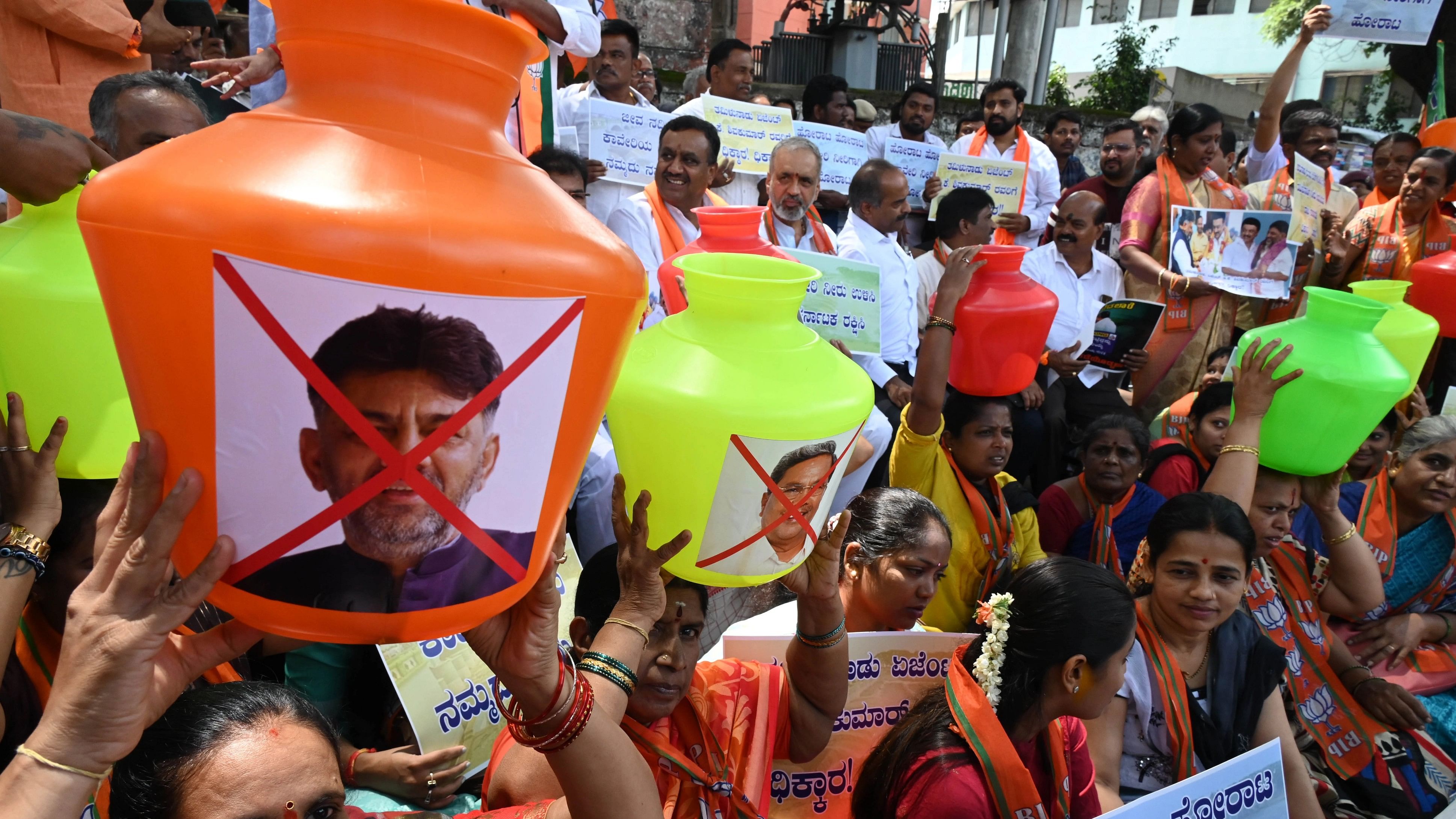
BJP party leaders and workers during a protest against the state government's release of Cauvery water to Tamil Nadu, at Mysore Bank Circle in Bengaluru on Saturday.
Credit: DH Photo
In keeping with the order of the Cauvery Water Management Authority (CWMA), after the Supreme Court declined to intervene in the matter, the Siddaramaiah-led Karnataka government decided to release the prescribed 5,000 cusecs to the lower riparian basin state of Tamil Nadu.
The sound decision comes in the wake of intensified stir by farmer groups and the Bharatiya Janata Party (BJP) leaders, who after their initial studied silence, now see an opportunity to embarrass the Congress government in Karnataka. On the other hand, Cauvery delta farmers in Tamil Nadu have also intensified their protests demanding water to protect their standing crops. The politics being played out over this agrarian problem cannot be overlooked.
However, the fact remains that working out an acceptable formula for sharing Cauvery River water during distress (drought/deficient) years has long been a contentious issue. Suggestions for pro-rata sharing of distress have not worked out.
Measuring distress has been a harrowing task for water experts over the decades where several Union governments intervened, mediated, and set up bodies to oversee the smooth sharing of river water.
The Cauvery Water Disputes Tribunal award, notified by the Centre, enjoins Karnataka to release 177.25 TMC (thousand million cubic feet) of Cauvery water to Tamil Nadu at Biligundlu during a normal year between June and May. In case it does not, the upper riparian state is to make good the shortfall the following week.
During normal monsoons water-sharing is not a problem, but this year the rains have been below par. In July, the Tamil Nadu government brought to the notice of the Union Ministry of Water Resources that Karnataka had not released the prescribed quantum of water. At a September 18 meeting, both states presented their case before the Cauvery Water Management Authority (CWMA).
One of the major rivers in India, the Cauvery has an inter-state basin that originates in Karnataka, passes through Tamil Nadu and Puducherry, and drains into the Bay of Bengal. In a normal year, Karnataka does make the stipulated release as Tamil Nadu receives the downstream water as it flows. But in water-stress years, Tamil Nadu expects Karnataka to release its share of water to irrigate standing crops. That said, neither state has moved away from sowing water-intensive sugarcane and paddy to other less water-intensive crops. Also, over the years the Cauvery delta has come under pressure from a rise in population, Climate Change, and altering water flows, among others.
The issue has always been emotive for both the states. While facing successive droughts in 2002, then Tamil Nadu Chief Minster J Jayalalithaa walked out of a meeting of Chief Ministers of the four riparian states convened by the then Prime Minister Atal Bihari Vajpayee in New Delhi as they were not reaching a resolution.
It appears that political compulsions stand in the way of the decades-old dispute being amicably settled. Both, the Congress in Karnataka and the Dravida Munnetra Kazhagam (DMK) in Tamil Nadu, are part of the I.N.D.I.A bloc and one would think it would be easier for allies to settle the dispute. However, history has shown that when it comes to regional issues each political party protects its own interests in the state.
So far, the Union government has stayed away from the crisis. The Water Resources Minister did not directly intervene when Tamil Nadu Chief Minister M K Stalin wrote to him. Many BJP leaders stayed away from an all-party meeting called by Siddaramiah. Till September 22 the BJP was in a wait-and-watch mode. Now, the national party is hoping to make inroads into Tamil Nadu by playing up this issue till the upcoming Lok Sabha polls. The stakes are high for the BJP which is not in power in both the states. Local party leaders are on the streets courting arrest, backing farmers’ call for day-long ‘bandh’ and building pressure on the Karnataka government.
Political considerations will not allow tensions to ease unless the withdrawing southwest monsoon or timely northeast rains come to the rescue.
(Gargi Parsai is a Delhi-based senior journalist)